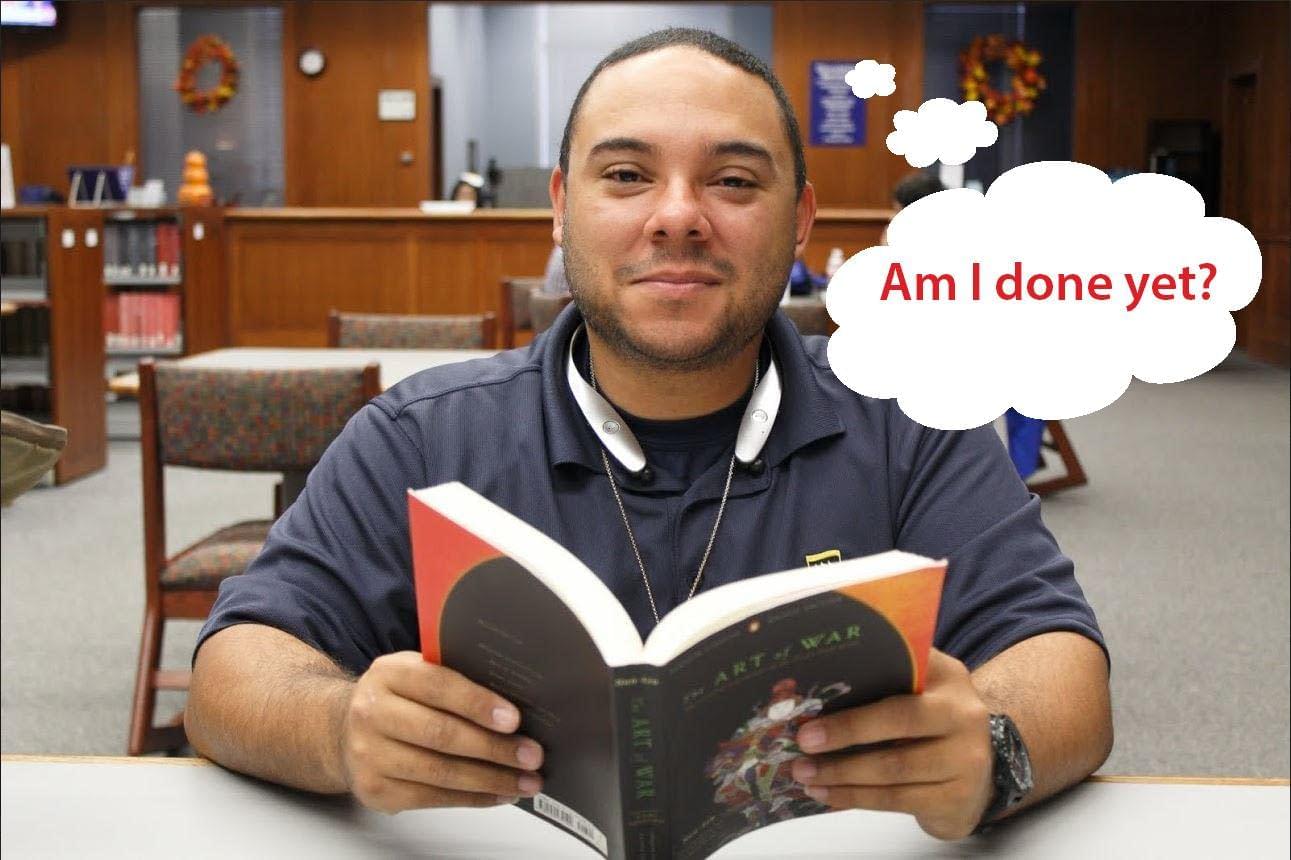
Crystal Hinshaw, a criminal justice major, is one of the hundreds of seniors graduating from Texas Wesleyan this semester.
She is also one of many students suffering from senioritis, which urbandictionary.com defines as a disease that has such symptoms as “laziness, an over-excessive wearing of track pants, old athletic shirts, sweatpants, athletic shorts, and sweatshirts. Also features a lack of studying, repeated absences and a generally dismissive attitude. The only known cure is a phenomenon known as graduation.”
Hinshaw said she has “definitely” experienced the disease.
“I don’t think it has affected my grades, but it has affected my study habits,” said Hinshaw, who is juggling 19 credit hours, a full-time job and being a single mom. “My biggest struggle about being a senior is the work load. It has been so much reading this semester. I have a ticker on my phone for countdown to graduation day.”
Joy Woods, a political science major with a pre-law emphasis, is also graduating in December, said still works just as hard as a senior as she has before.
“I don’t think my study ethic and work ethic has changed, but this semester it’s more that time management has had to change,” Woods said. “I can’t study the night before anymore. I have to start three, four or five weeks in advance for tests. That’s really the main thing that has changed from when I started at Wesleyan to now.
“I do have a little senioritis when it comes to the more simple classes. It’s not because I want to, it’s because I am exhausted from studying in everything else.”
Woods said that the hardest thing about graduating this semester is finding a job that she can do before she goes to law school in the fall of 2016.
“I really need a break, but it’s still nerve racking,” Woods said.
Dr. Eddy Lynton, assistant professor of criminal justice and sociology, said he really loves how the smaller classes allow professors to know the students. As a result, he can see that many seniors are experiencing senioritis.
“I have worked with my students for the past years and I can tell they are ready to be done at this point. They still committed to their work but there is some tension because they are also looking to the future and that graduation day,” Lynton said.
“The students are still holding their ground on their work ethic, although they are not as excited as they used to be about getting in there and jumping on the work. It’s more to just ‘let me do what I got to do.’ Right now we talk about getting to that finish line. If you run the race, it’s a shame to stop running or running as hard when you’re so close to the finish line.”
Lynton said he can tell from some students’ body language when they look like they just want to shut down, but he doesn’t have any leniency with his students.
“What we do as professors is pull the students to the side and talk things through,” Lynton said.
Criminal justice major, Clinton Riggins IV, who is also graduating next month, said despite what his professors may have said, he isn’t trying to stay under the radar.
“The professors look out for you and make sure you’re doing what you’re supposed to be doing and how you’re supposed to be doing it,” Riggins said. “If you start to veer off, they kind of help get you back into place like a mentor would.”
Riggins said his philosophy is that “if you have that little bit left, you might as well just dead sprint it to the end and finish hard as much as possible.”
“One of my classes has been tempting to slack in, but I try to tell myself I’m a sophomore so I will keep pushing through,” Riggins said.









![Pippin, played by Hunter Heart, leads a musical number in the second act of the musical. [Photo courtesy Kris Ikejiri]](https://therambler.org/wp-content/uploads/2025/04/Pippin-Review-1200x800.jpg)
![Harriet and Warren, played by Trinity Chenault and Trent Cole, embrace in a hug [Photo courtesy Lauren Hunt]](https://therambler.org/wp-content/uploads/2025/02/lettersfromthelibrary_01-1200x800.jpg)
![Samantha Barragan celebrates following victory in a bout. [Photo courtesy Tu Pha]](https://therambler.org/wp-content/uploads/2025/05/20250504_164435000_iOS-834x1200.jpg)





![Hunter Heart (center), the play's lead, rehearses a scene alongside other student actors. [Photo courtesy Jacob Sanchez]](https://therambler.org/wp-content/uploads/2025/04/thumbnail_IMG_8412-1200x816.jpg)
![Student actors rehearse for Pippin, Theatre Wesleyan's upcoming musical. [Photo courtesy Jacob Rivera-Sanchez]](https://therambler.org/wp-content/uploads/2025/04/Pippin-Preview-1200x739.jpg)
![[Photo courtesy Brooklyn Rowe]](https://therambler.org/wp-content/uploads/2025/05/CMYK_Shaiza_4227-1080x1200.jpg)

![Lady Rams softball wraps up weekend against Nelson Lions with a victory [6 – 1]](https://therambler.org/wp-content/uploads/2025/04/Screenshot-2025-04-04-100924-1200x647.png)
















![Rambler staff pose following the Texas Intercollegiate Press Association Convention award breakfast. [Photo courtesy Dr. Jenny Dean]](https://therambler.org/wp-content/uploads/2025/04/IMG_2646-1200x900.jpeg)